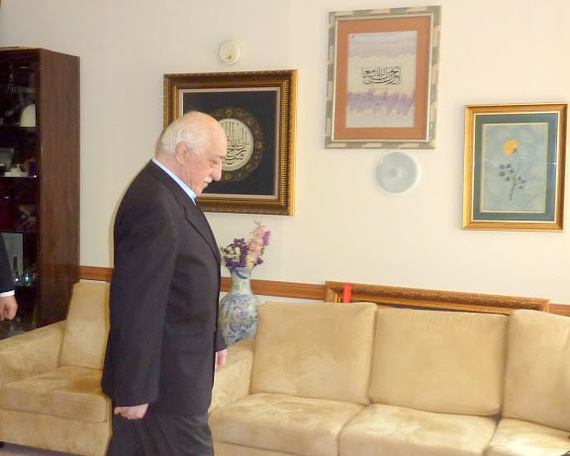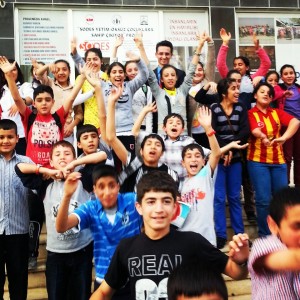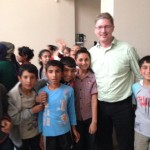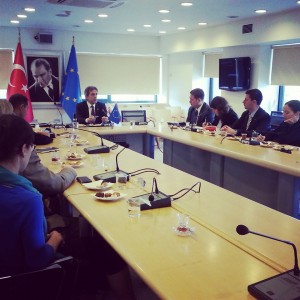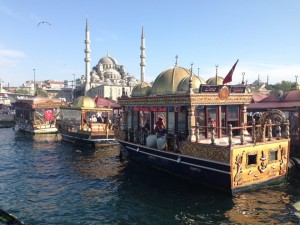Below are the remarks as prepared by USCIRF Chair Katrina Lantos Swett for her luncheon talk at the Rumi Forum.
Details of the luncheon are
here and the video
here.
Remarks by USCIRF Chair Katrina Lantos Swett
Rumi Forum Luncheon Speaker Series
Washington, D.C.
Wednesday, February 13, 2013
Introduction
Thank you for that kind introduction.
I want to thank you for inviting me to be your luncheon speaker here at the Rumi Forum.
And I especially want to thank Emre Celik, President of the Forum, for graciously agreeing to be the moderator of today’s event.
For more than a decade, the Rumi Forum has been the kind of vehicle we need, where people from various backgrounds and beliefs can come together in one place -- and learn from each other.
To learn implies listening -- and to listen implies respect and toleration.
I am grateful indeed that the Rumi Forum is about respect for our fellow human beings and toleration of their right to express their views openly and candidly and to see those views discussed and debated in a civil, fair-minded, and illuminating way.
Today, with our world growing ever smaller, more people than ever before are being confronted by the full range of thought and opinion which characterizes the human family.
For the first time in history, hundreds of millions if not billions of people are being exposed to beliefs and attitudes that differ profoundly from those they have known since their birth.
In this new world, respect and toleration are not optional, but absolutely necessary. The alternative is more conflict and strife, more violence and war, more destruction and despair.
This does not mean that every person must respect the content of everyone else’s opinion. That, of course, would be impossible. What it does mean is that every person must respect the other person’s right to have an opinion and to voice that opinion. And what it also means is that even when another person’s opinion contradicts everything we believe, we must do all we can to respect the person who is voicing the opinion and to treat that person with dignity and civility.
In other words, if we want a more peaceful, prosperous, and stable world, we must stand for freedom. Freedom of thought and conscience, freedom of religion or belief, and freedom of association and assembly must be honored and upheld. To suppress freedom in the name of stability is to create precisely the conditions that make stability impossible.
Today I’m going to focus on freedom of religion. I will discuss why it matters, how it’s in jeopardy, the challenge it faces from violent religious extremism, and the need to counter extremism and advance liberty.
During the time that I have, I’m going to use my recent trips to Egypt and Saudi Arabia to highlight my main points.
So with this in mind, let’s begin.
Today, there are three inescapable facts that that serve as a starting point for any discussion about religious freedom.
First, across the globe, religion matters.
From worship to prayer, births to funerals, weddings to holy days, almsgiving to thanksgiving, for billions of people, religion remains an inescapable source of identity, meaning, and purpose.
Second, because religion matters to so many, so does religious freedom.
Simply stated, people want the freedom to practice or not practice any religion according to the dictates of conscience.
Third, in all too many countries, the very freedom that people want is being denied.
According to a Pew Research study released last August, 75 percent of the world’s population -- over 5 billion human beings -- lives in countries with very high restrictions on religion. These restrictions can range from onerous rules and regulations to imprisonment, torture, and even murder.
Abuses of religious freedom must never go unchallenged.
This is not just the opinion of the United States or a reflection of our First Amendment.
It’s a fundamental premise of international human rights law.
In 1948, the world community created and adopted the landmark Universal Declaration of Human Rights, including Article 18, which states the following about freedom of religion or belief:
Everyone has the right to freedom of thought, conscience, and religion; this right includes freedom to change his religion or belief, and freedom, either alone or in community with others and in public or private, to manifest his religion or belief in teaching, practice, worship and observance.
Since 1966, the governments of 167 countries have signed the International Covenant on Civil and Political Rights, a binding treaty with protections similar to Article 18.
Nations around the world also affirmed the 1981 Declaration on Religious Intolerance, and other regional bodies, such as the OSCE, the Council of Europe, and the Organization of American States also affirm religious freedom as a fundamental liberty.
As an independent, bipartisan, U.S. federal government commission, USCIRF is firmly committed to the human rights standards found in these documents.
Clearly, religious freedom is a pivotal human right that must be defended.
Three Kinds of Religious Freedom Violations
As a key part of its mandate, USCIRF monitors religious freedom worldwide and makes policy recommendations to the President, the Secretary of State, and Congress.
Based on our monitoring of religious freedom conditions, we have found there are at least three kinds of violations engaged in or allowed by nations and their governments.
First, there is state hostility toward religion, religious communities, and religious leadership.
Second, there is state sponsorship of violent extremist religious ideology and education.
And third, there is state failure to prevent and punish religious freedom violations.
State hostility involves the government actively persecuting people or groups on account of their beliefs.
State sponsorship refers to the government actively promoting -- including exporting -- religious ideas and propaganda, often of a violent, extremist nature, that include calls to violate the religious freedom of others.
And state failure means that the government is neglecting to take action to protect people whom others are targeting due to their beliefs, creating a climate of impunity in which religious dissenters are threatened, intimidated, or even murdered.
When it comes to state hostility toward religions, one of the worst persecutors is the theocratic government of Iran.
Regarding state sponsorship of radical ideology which targets the religious freedom of others, Saudi Arabia’s autocratic monarchy continues to export its own extremist interpretation of Sunni Islam through textbooks and other literature which teach hatred and even violence toward other religious groups. [Add comments about Saudi trip, particularly relating to state sponsorship]
Extremist references that devalue “the other” are also found in educational materials and textbooks in Iran and Pakistan.
Regarding state failure to protect religious freedom, the actions of the government of Egypt exemplify those of nations which do not protect their citizens against religiously-related violence.
In Egypt, since the fall of Hosni Mubarak, the government has continued to tolerate widespread abuses against religious minorities, including Coptic Orthodox and other Christians, as well as Baha’is, Shi’a Muslims, and dissident Sunni Muslims.
It has failed to take adequate steps to bring the perpetrators of violence to justice or to respond to virulent anti-Semitism in state-controlled media. [Add comments about recent Egypt trip.]
Religious Freedom vs. Violent Religious Extremism
In viewing these three types of violations, we see a strong correlation between the lack of religious freedom and a lack of social stability and harmony.
Indeed, a number of studies show that while countries that honor and protect religious freedom are more peaceful, stable and prosperous than those that do not, nations that trample on this freedom provide fertile ground for poverty and insecurity, war and terror, and violent radical movements and activities.
Evidence for this can be seen in the trail of nations hosting Osama bin Laden in the years and decades before the 9/11 attacks. All of these countries – Afghanistan, Saudi Arabia, Sudan, and Pakistan – had either perpetrated or tolerated world-class violations of religious freedom. Indeed, bin Laden was educated in one of them -- Saudi Arabia.
Last December, we saw further evidence in the release by the Institute for Economics and Peace, based in Sydney, Australia, of its Global Terrorism Index which ranked nations based on the number of terrorist attacks committed between 2002 and last year.
Seven of the top ten nations are either on our Commission’s Watch List of serious religious freedom violators or among our recommendations to the State Department for CPC status, marking them, in our judgment, as the world’s worst religious freedom abusers. These seven countries are Iraq, Pakistan, Afghanistan, India, Somalia, Nigeria, and Russia.
This leads us to a question: Why is there a correlation between lack of religious freedom and the presence of social disharmony, including violent religious extremism?
There are at least three plausible answers.
First, governments that actively persecute people or fail to protect them against persecution can unwittingly drive these people into the hands of violent religious extremist groups opposing the government.
Second, governments that enforce laws which violate religious freedom, such as blasphemy laws, unwittingly encourage individuals to aggressively monitor members of disfavored religious groups for signs of trespass, and to take violent action against perceived transgressors.
And finally, governments that restrict the religious freedoms of all of their citizens in the name of fighting violent religious extremist groups unwittingly end up strengthening these same groups by weakening their more moderate but less resilient competition. A key example is that of Egypt, which under the rule of President Mubarak ended up strengthening the Salafists while weakening their less radical opponents, from moderate Muslims to liberal secularists.
The Arab Spring and the Future
So what can be done about religious freedom violations?
For Saudi Arabia, for example, where the problem is a religious ideology that represses competition and is exported through literature which fuels violence against disfavored groups, we recommend that the U.S. lift its waiver on punitive measures on the Saudis for these and other abuses.
And for Egypt, where the impunity problem is worsened by longtime government bias against religious minorities, we recommend that they be pressed not only to bring violent attackers to justice but also to repeal discriminatory degrees against religious minorities and abolish blasphemy codes. We also recommended in our 2012 Annual Report that Egypt be designated as a CPC for its severe, egregious violations of religious freedom, joining Saudi Arabia and other CPC nations.
Hopes for the Future
So what does the future hold for religious freedom in these and other Muslim-majority countries?
The initial revolutions of the Arab Spring were launched by citizens who rejected both violent religious extremism and secular dictators who sought to repress not just the extremists but the rest of the population.
By no means have these citizens gone away. They are still fighting for greater religious freedom and while they have suffered setbacks, they could well represent a critical mass of people across the Middle East and in other Muslim-majority areas.
Moreover, the efforts of various nations to draft constitutions provide a window of opportunity to consider how religious freedom can be enshrined in such documents. It is for this reason that earlier last year, USCIRF issued its report, “The Religion-State Relationship & the Right to Freedom of Religion or Belief.” The report analyzes how constitutions of countries belonging to the Organization of Islamic Cooperation treat issues of human rights and religious freedom.
Indeed, these constitutional processes provide a generational opportunity to enshrine the fundamental notion that all human beings in every nation have the right to think as they please, believe or not believe as their conscience leads, peacefully practice their beliefs, and express them openly without fear or intimidation.
They offer a chance to establish internationally recognized standards which affirm that religious freedom is for each and every person. That includes the right to manifest one’s faith and convictions, individually or in one’s community of faith, in public or in private, and the right to change one’s religion. It is restricted only under narrow circumstances which international law specifies.
Make no mistake. Getting this process right will place countries on a positive trajectory, but getting it wrong by restricting religious freedom will guarantee future conflict and human rights violations. This is a human rights concern, of course, but also one of national security for everyone in the United States who wants a safer and more stable world.
Last December, Egypt approved by referendum a draft constitution which unfortunately included a blasphemy provision and other problematic articles limiting religious freedom.
While a number of countries in the Middle East and North Africa criminalize blasphemy in their penal codes, none had explicitly done so in their constitutions. By stifling the peaceful and constructive exchange of ideas, blasphemy laws underscore the intimate link between freedom of religion and freedom of expression. By punishing the expression of unpopular beliefs and opinions, blasphemy provisions not only violate both of these freedoms, but exacerbate intolerance and abet extremism and violence. Elevating blasphemy laws to a constitutional level would be a grave mistake indeed.
Despite these challenges, it is still very possible that religious freedom will progress in a number of nations we’ve mentioned today. To be sure, enshrining this freedom in a country’s constitution won’t ensure its respect in practice. Yet provisions limiting this right will taint legal systems, making respect for religious freedom extremely difficult on the ground.
Thus, constitutional texts really do matter, both as statements of a nation’s laws and aspirations and as ways for people to hold their government accountable for protecting their rights.
Clearly, the struggle for religious freedom remains an uphill one, but the calls for protection of this fundamental right are being amplified as never before.
They are being heard across countries and continents, demanding an end to the status quo of repression and impunity.
The message they send is clear: religious freedom matters and must be cherished.
It is time for governments around the world to hear and heed this message, for the sake of freedom and dignity, prosperity and security.
It is time for us – working together – to redouble our efforts to advance this great goal for all.
Thank you.


